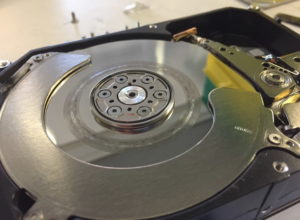
A hard drive with severely damaged platters.
If you’ve lost data from a hard drive and you need to get it back, the best practice is to clone your drive — but only if the drive is in working condition.
Cloning a hard drive is an intensive process, and if a hard drive is in the initial stages of failure, performing a bit-for-bit clone could cause a read/write head crash or another serious malfunction. In some cases, operating the hard drive can remove magnetic material from the platters, causing permanent data loss.
The safest course of action is to send your drive to a reputable data recovery provider. You generally have one chance to recover your data; you don’t want to cause irreversible data loss by making a basic mistake.
In another article, we detailed the process for using ddrescue, a powerful cloning tool, to clone a storage device. But before you follow those steps, read the rest of this article (and if you’re uncomfortable performing a clone, schedule a risk-free media evaluation with Datarecovery.com).
Clone hard drives before attempting logical data recovery.
You should clone your hard drive if you’re 100% sure that you’re dealing with a logical (non-physical) issue. Some examples of logical data loss scenarios include:
- Accidental file deletion.
- File corruption caused by a software crash, operating system crash, or power failure. If file corruption is widespread, check your hard drive’s health before proceeding.
- Damage due to malware.
- Accidental repartitioning.
We do not recommend running data recovery software on original media — once again, if you’re working with the original device, you have one chance to restore your files. Cloning the drive provides a level of redundancy; if the attempt fails, you may still have options.
Do not clone a hard drive if it shows any symptoms of physical failure.
As a general rule of thumb, you shouldn’t clone a hard drive if you’re unsure what happened. Physical hard drive failure symptoms vary greatly. In some cases, a hard drive will appear to operate normally, but files will become corrupt due to head alignment issues or other problems with physical components.
The classic symptoms of hard drive failure include:
- Clicking sounds, whirring sounds, or other unusual noises.
- A large number of bad sectors.
- A large number of corrupt or unreadable files.
- “Disappearing” files.
- The drive does not power on.
- The operating system does not recognize the hard drive.
- The operating system reports an inaccurate capacity for the hard drive.
If a hard drive is failing physically, cloning it may make the problem much worse. If you do clone a hard drive with potential physical issues (and again, we strongly recommend seeking professional assistance), review the settings of your cloning software.
In ddrescue, for example, you should not use the –rN component, which forces ddrescue to attempt to read damaged or unreadable sectors. For a full breakdown of ddrescue commands, read: How to Clone Hard Disks with ddrescue.
The best course of action is to trust a reputable data recovery provider.
Data recovery engineers can repair damaged components and clone media in a controlled environment, greatly limiting the chances of permanent data loss. Our laboratories are equipped with certified cleanrooms, proprietary software, and firmware repair tools — resources that are not widely available to home computer users or even professional computer repair shops.
And while data recovery can be expensive in certain circumstances, we’ve designed our services to provide clients with peace of mind. We provide risk-free media evaluations for all hard drive brands and models, and all of our services are supported with a no data, no charge guarantee: If we’re unable to successfully recover the files that you identify as important, you don’t pay for the attempt.
To learn more, call 1-800-237-4200 to speak with an expert or schedule a free evaluation online.





